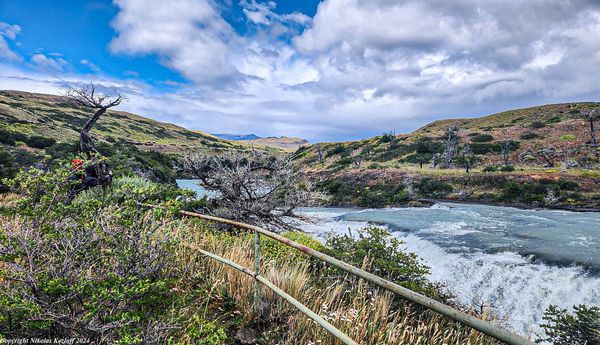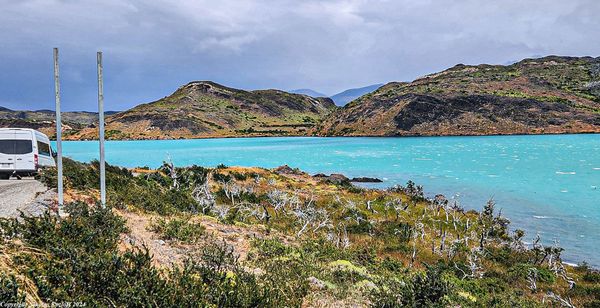
Amidst rapidly intensifying global climate disasters, Chile has become the latest casualty. Fueled by strong winds and a heat wave, recent forest fires have killed more than a hundred people. El Niño, a cyclical climate phenomenon, created hazardous conditions prior to the fires by contributing to heat and drought, while global warming drove temperatures upward.
For years, however, Chile has been suffering from such drought, which has dried up forests and depleted water supplies. Indeed, over the past decade, almost two million hectares of land have burnt to a crisp. Confronted by one of the worst tragedies in his country’s recent history, President Gabriel Boric declared a two-day period of national mourning in February.
Though certainly destructive in terms of size and scope, I was not surprised by the fires. In the weeks leading up to the disaster, I was making my way through the country in tandem with research and a book project concerning Charles Darwin’s legacy in the context of climate change. The naturalist, who traveled throughout Chile and South America aboard H.M.S. Beagle, between 1832 to 1835 would not have denied the environment is changing; however, the pace of current day natural catastrophes would have undoubtedly concerned him.
As I roughly retraced Darwin’s route, I became aware of the threat of forest fires. In Torres del Paine National Park, I spotted a glacier in the distance, though such picturesque scenes were interrupted by the sight of burnt patches of trees. To be sure, not all fires are negative, since they can help get rid of dead vegetation or encourage forest clearings featuring greater species diversity.
However, my guide explained that local fires linked to human error and carelessness have become more intense and difficult to extinguish. Climate change, he added, has contributed to such blazes amid low humidity and elevated temperatures. Speaking to members of a forest brigade, I learned that seasons had now become unpredictable and “super different.” Fires, meanwhile, posed a risk to beloved wildlife species such as pumas and South Andean deer.
During his travels, Darwin explored the island of Chiloé where he observed houses made of alerce, also known as Fitzroya cupressoides. The naturalist named the tall deciduous tree after Beagle captain Robert Fitzroy. To his credit, Darwin recognized that planting a mixture of species can result in faster growth than species planted individually. However, the naturalist was also a product of his time, and regretted that locals in the vicinity had not cleared the woods to make efficient use of natural resources.

In other areas of the country hit by recent heat and drought, large plantations full of flammable trees lie in close proximity to cities and towns. Eucalyptus, a common tree found on plantations, burns relatively rapidly. In view of these trends, experts agree that plantations make the landscape much more prone to fire as opposed to maintaining intact native forests.
Moreover, in contrast to native forest, which exhibits a wide spectrum of vegetation and animal species, plantations display the most homogeneous conditions possible. Traveling north, I felt suffocated by the heat during an interminably long bus ride. Peering out the window, I spotted large forest plantations along the highway sporting rows and rows of uniform trees, just some of the more than three million hectares of forest monoculture which has turned Chile into a leading cellulose exporter.
Just how much specific blame can be pinned on the Boric administration for Chile’s dire environmental straits is up for debate: though the forestry sector has been poorly regulated, last year the president launched a national plan to prevent, mitigate and fight forest fires to make the forestry industry more resilient to climate change. The government also increased funding for firefighting, though needless to say, such moves did little to prevent recent blazes.
What are the chances that Chile’s unfavorable ecological picture can be reversed? For answers, I caught up with Felipe and Constanza Espinosa of the Chilean Glacier Foundation at a café in Santiago. Felipe, the management and operations director for the group, said he was gratified by a substantial 2019 climate change protest in the capital. The momentum seemed to continue with the election of Boric in late 2021. A 36-year-old former lawmaker and the most leftist-leaning leader since Salvador Allende, the new president called for constitutional reform.

Constanza, Felipe’s sister and the foundation’s director of communications and outreach, did not hold grand expectations for the government. Despite radical constitutional terminology, she remarked that the Ministry of the Environment still focused on managing natural resources, as opposed to truly protecting the environment. On the other hand, considering Chile’s environmental distress, could Boric become a spokesperson for international climate action in the mold of, say, former Bolivian President Evo Morales? The country is responsible for a tiny fraction of world-wide emissions, yet Chile is particularly vulnerable to drought and desertification. A more combative Boric seemed unlikely, she answered, given the president doesn’t seem interested in challenging the Global North, but rather maintaining friendly relations.
It’s the last day of my stay in Santiago before catching a late-night flight back to New York. In the midst of record temperatures and heat alerts, not to mention the onset of Chile’s deadly wildfires, I’m contemplating Darwin’s legacy once again. Apocalyptic extinction or adaptation?
The sobering new reality seems apropos as I sit down with Bárbara Saavedra, director of the Wildlife Conservation Society in Chile. Considering Chile’s climate emergency, she says, society must recognize that “nature isn’t infinite” and impose limits on the use of natural resources. An evolutionary biologist, Saavedra is concerned about charismatic animal species such as Darwin’s frog, which is facing an uphill conservation battle like other amphibians, and Darwin’s fox, whose population has become diminished and fragmented.
And what of Boric — has the young and idealistic president turned out to be a political disappointment? “The constitutional reform wasn’t his defeat,” she says, “but rather a defeat of our entire country.” Pausing, she adds, “on the other hand, I don’t see the reform as a defeat, but rather as forming part of a long-term process which is challenging and still hasn’t played itself out entirely. I’m not a politician, but I believe there will be other opportunities in future. Even without the reform, however, we have other laws and tools at our disposal to resolve our environmental problems, and there is sufficient willingness to measure up to our challenges.”







